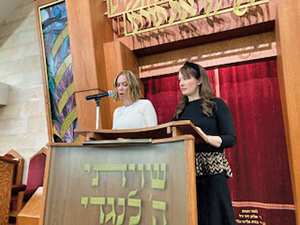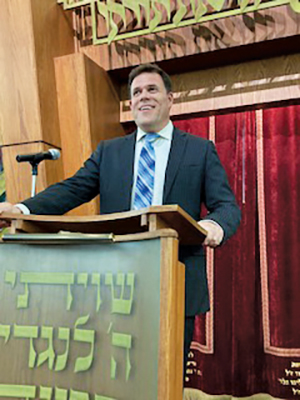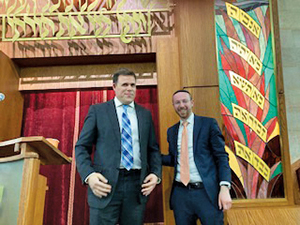
Emma Horowitz.
A hive of CSS Security with externally positioned Teaneck police support greeted over 500 attendees last Saturday night, Feb. 3 at a briefing co-sponsored by Congregation Bnai Yeshurun and the Bergen County Jewish Action Committee (BCJAC).
Rabbi Elliot Schrier opened the evening with his always poignant remarks and a litany of thank yous for the many individuals involved in coordinating and running the event, right down to the building staff who helped set up, as well as a big shout out to the Teaneck police and the security personnel.
He then introduced BCJAC committee heads Emma Horowitz and Chana Shields who spoke briefly about the function of BCJAC and the importance of civic engagement.
The guest speaker, Jonathan Conricus, was uniquely qualified to speak about the military and political perspective of the impact on Israel of Operation Iron Swords. As spokesperson for the IDF during the first three months of the war against Hamas, his credentials and experience outrank most political and armed forces commentators, as he served 24 years as an IDF lieutenant colonel combat commander in Lebanon and Gaza. He was also the first IDF officer to be seconded to the United Nations headquarters in New York providing strategic analysis for U.N. peacekeeping.

Conricus was a pleasant and engaging speaker, injecting some light humor into his remarks considering the seriousness of his topic. He minced no words in describing the difficulty of Israel’s military and political challenges and the many factors that compel them. “Israel is currently involved in the historically unprecedented situation of fighting a war on seven different fronts. No other country in history has ever had to do this; never mind do it alone.”
He noted that even as UNRWA has been exposed as aiding and funding Hamas terror operations rather than dedicating its efforts to the humanitarian aid for which it was mandated. “There will be no stability or peace as long as UNRWA exists. It’s not good for Palestinians and it’s not good for Israel; it eternalizes the certainty of continued fighting.”
On the other hand, he explained, “they are the second biggest employer in Gaza. This is how basic ’public works’ is accomplished, like trash management, etc. If UNRWA doesn’t do it, then the IDF will have to assume all of the responsibility and logistics.” He suggested a better, albeit complicated, plan: “Change the status of the refugees.” Commenting further about the misuse of humanitarian aid to Gaza, he noted that Hamas would be the last to suffer by cutting off supplies. “Hamas hijacks most of the supplies. It would affect the civilians and hostages more than Hamas.”
Conricus was unabashed in exposing the role of Egypt as being a passive participant in the underground weapons transport operation while simultaneously manipulating its “above ground” appearance to seem politically heroic by bartering ceasefires.

He was also quite clear in reporting that the IDF has informed the Israeli government that it could suspend its operations briefly to facilitate a hostage rescue or other maneuver that would free the hostages. While they realize there would be a military cost to a pause, they are also confident, said Conricus, that they could sustain it and then continue. It would just delay the completion of their mission and possibly provide time for enemy reorganizing and reloading munitions “… ultimately ending in a clear victory in Gaza, when the world will see what happens when you attack Israel and commit horrible crimes. Let it be a lesson for our enemies …”
Conricus was also candid in his remarks that Israel and the IDF need to do and will do things very differently going forward so that the attacks of Oct. 7 can never happen again. With all of this somewhat grim information, he was also infectiously optimistic; he could smile through the pain that the audience all shared and felt.
Conricus also shared a progress report on the development and deployment of new technology. The Arrow defense system that takes down ballistic missiles has been essential. He was absolutely emphatic in thanking the U.S. and especially AIPAC for advocating to Congress for the funds needed for this essential system. “Because the new system, called ‘Iron Beam,’ is a laser system, it doesn’t require approval for replenishment, is more self-sufficient, and operates at a fraction of the cost.” He indicated Israel will learn more over the next few months of testing and operation how this system functions, but it seems to have great promise at this time.
Conricus fielded numerous questions from a rapt audience and closed his address with encouraging words and appreciation. One person asked if he had advice to offer. “I’m not so good at that,” he quipped with a big smile and an appreciative chuckle from the audience.

He added, “But we must have clarity in the justness of our cause, of doing the right things despite what the other side, and the media, throws at us, and to continue to believe in what we are doing. It’s been a dark reality for us to see clearly what the enemies really want. But knowing that strengthens the spirit of our foundation and reflects our values.” He also wanted everyone to know that “the soldiers know their support is solid and they feel the support from their brothers and sisters around the world. The delegations and missions matter tremendously to Israel in not feeling alone; that others care and are involved.”
The BCJAC seeks the community’s involvement and support. To contact the BCJAC, email info@bcjac.org.
Ellie Wolf is a staff writer at The Jewish Link.








